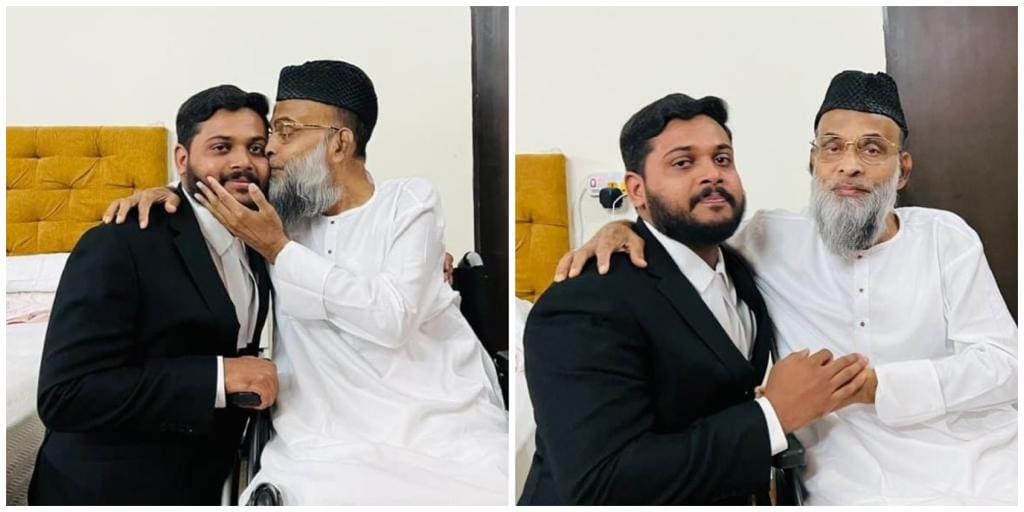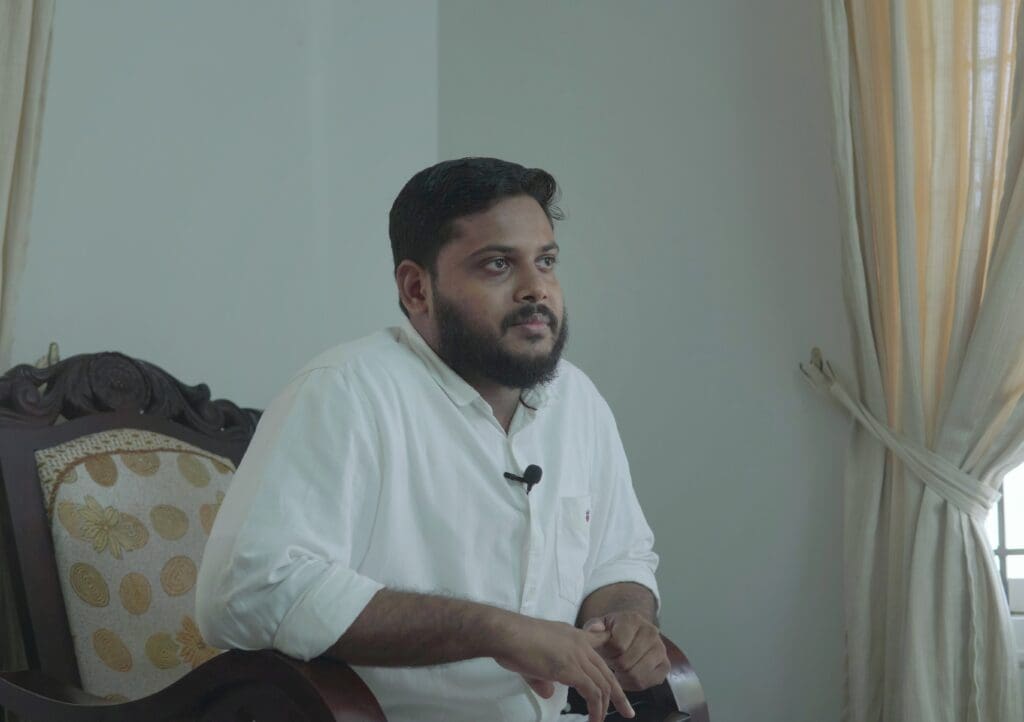
Salahudeen Ayyoobi was 10 months old when his father and Peoples Democratic Party chairman Abdul Nasir Maudany got arrested and sent to Coimbatore central jail in 1998. Unlike other kids, Salahudeen grew up visiting his father in jail.
Salahudeen rarely spent time with his father during his childhood. His limited memory was those periodical visits to the jail, amidst tight security, and looking at his beloved father standing behind the bars at the visiting space and graciously looking at his skull cap and a magnificent beard.
His father’s oratory skills, analytical and intelligent skills, empathy, and caring nature, Salahudeen learned through the admirers across Kerala, was a forbidden treasure for him to enjoy. Every day in his life, he lived the injustice unleashed by the Indian judiciary system and coped through the vacuum created by his father’s absence.
“Father’s absence left a void in my life which cannot be filled by anything. There are no ways to cover it up. I crave for his presence during Eid days and to guide me through my academics,” said Salahudeen, while sitting in the guest area of his two-storey house in Ernakulam district’s Kaloor.
However, at least two decades later, an example of poetic justice can be seen in the enrollment of Salahudeen at the Kerala High Court. He graduated from Bharat Mata College with a degree in Legal studies in January 2023 and has now enrolled today, March 19, 2023.
According to Salahudeen, the degree of injustice his father and family faced throughout his life and the prolonged legal fight in the Indian courts are the major driving force behind his decision to study law and his father inspired him to pursue law.
Salahudheen’s father Abdul Nasir Maudany, an assertive Muslim politician who founded Islamic Sevak Sangh and People’s Democratic Party, was arrested in connection with the Coimbatore bomb blast on 31 March 1998. After spending around 9 years in jail, he got acquitted of all charges in August 2007.
However, in August 2010, he was arrested and taken to Parappana Agrahara central prison in Bangalore in connection with the 2008 Bangalore blast case. In July 2014, Maudany got bail on medical grounds by the Supreme Court on the condition that he will not leave Bangalore and the government is at liberty to take all steps, including putting him under surveillance, to ensure he does not get in touch with witnesses in the case.
Similarly, his wife Sufiya Madani was arrested from her residence in December 2009 in connection with the burning of a Tamil Nadu bus in Kerala’s Kalamassery in September 2005. She got bail in 2009 from rom the NIA court under the condition not to leave Ernakulam district without permission. The court later relaxed her bail in July 2014 after she approached the court to grant her permission to visit her husband in Bangalore who was battling with many health issues, including diabetes and urinary issues.
Maudany lost his right leg in August 1992 following a bomb attack from an RSS cadre near Anwarssery in Kerala’s Kollam district. In April 2021, the Muslim leader moved the Supreme Court seeking permission to leave Bangalore for his hometown in Kerala, citing health issues. However, the then chief justice of the apex court denied him permission and called Maudany a “dangerous man.”
Salahudeen spent most of his childhood thinking that it’s normal for a grown-up person to end up in jail and similar to him most of the kids’ fathers are in jail.


“I thought the only time they were allowed to meet is during festivals or another day of special occasions,” he said.
Although Abdul Nasir Maudany will not be able to attend his son’s enrolment due to safety reasons and bureaucratic red tape, he is so satisfied and happy with his son’s achievement.
An elixir of happiness amidst the dark days and nights of grave injustice,” his father took to Facebook to share Salahudeen’s achievement.
“I want to meet him in person and need to watch that excitement in his eyes,” Salahudeen said with proudness in his eyes.
Maudany is currently struggling with a lot of illness and was advised to take rest by his doctors. They also advised him not to talk over the phone for a long time.
“I missed my parents’ presence almost all important stages of my life. The prolonging tale of injustice is the sole reason behind those missing,” Salahudeen said.
Salahudeen made up his mind to pursue law while he was studying in the ninth standard.
“It’s the need of the hour for the marginalised community including Dalits, Muslims, and Adivasis to study law, represent them in court, and fight for justice. They must be part of the judiciary and aw-making institutions,” he added, stating the importance of representation in the legal sector.
According to him, a judge from a marginalised community or with lived experiences of injustice might be able to ensure righteous judgments. “They will be able to understand and empathise with the pain, injustice, and problems faced by the common man and its impacts on their daily life. Instead of merely seeing it as a profession,” he said.
However, due to his father’s prolonged imprisonment under draconian laws, Salahudeen missed the privilege of having a smooth school education. He spent the lion’s share of his academic life, almost 13 years, in boarding school as his family don’t want his study to get affected by the case. There were days in which Salahudeen cried the whole night in hostel beds due to the injustice faced by his family.
“We have experience in the management of an educational institution expressing their concern over continuing my studies due to case-related issues. We respected their concern, discontinued the course, and enrolled in other institutes,” he said.
“Although we faced many hardships in life, there were many people who supported us, considered us as their family members, and showered us with love and care. Those love and affections healed us and empowered us to survive,” he said while showing a black-coloured Mont Blanc pen gifted by renowned writer Kamala Surayya’s son Nalappad in his childhood wishing him successful academics. “I am planning to carry this pen with me on my enrolment day,” he said.
Although many college-mates empathised Salahudeen’s cause and offered solidarity, a few of them were of the notion that his family is of terrorists. “As they started interacting with me closely, hanging out with me, understanding my ideals and principles, they started to rethink about the manipulated portrayal of my family and became so close in the next 5 years,” he said.
Salahudeen points out the media trial as the main reason behind the vilification of his family. “Those innocent people portrayed as criminals and terrorists by the media, have to carry the scar of accusation even after they got acquitted. There are many lives in the country destroyed by the media. Those lives include our family too. For the general public, their reference materials are those distorted facts and constructed lies peddled by the media. Common conscience was formulated from those biases,” he said.
During our one-hour-long conversation, he highlighted that the prolonged jailing of undertrial prisoners is a grave injustice not only for them but to their close ones including children, parents, spouses, and comrades.
“This crisis must be addressed with seriousness by civil society. Such prolonged incarcerations might halt the creative intervention by those individuals aimed at societal change and would affect the progress and welfare of the society as a whole,” he said.
The system ensures prolonged incarceration mainly by delaying the filing of the chargesheet and presenting fabricated evidence and witnesses in court. Salahudeen alleged many witnesses presented by the investigation agencies on his father’s case later confessed to the court that they were forced by the investigation agencies to give false testimonies and a few of them were not even interrogated but their testimonies were included.
“Under the present circumstances, it’s easy for an investigating officer or an agency to persuade an individual or force him/her to give false witness testimony in court. There must be a responsible system to effectively monitor the investigation process and ensure transparency,” he said.
Although many people were offering solidarity and empathising with political prisoners, most of them were unable to stay with the cause for long term. In most cases, family and closer ones of the prisoners were left to fight the battle alone, he said, questioning the silence of the Kerala society over his father’s arrest.
“Be it the public or responsible individuals, most of them were silent on the injustice faced by my father. My father has been battling with various issues including legal and health. He is fighting every day for his existence. But the concerned authorities and rights advocates were relatively silent,” he added.
Being the elder son of a man who propagated the politics of the unity of the oppressed in Kerala at least three decades ago, Salahudeen is well aware of the hope and aspirations many people have in him. “There are many unfinished social justice missions and movements kickstarted by my Vaapachi (father). I am planning my future in a way to be part of it and play my role in it,” he said.



